Follow Your Different
191 Kara Goldin Founder/CEO Hint Water is Undaunted
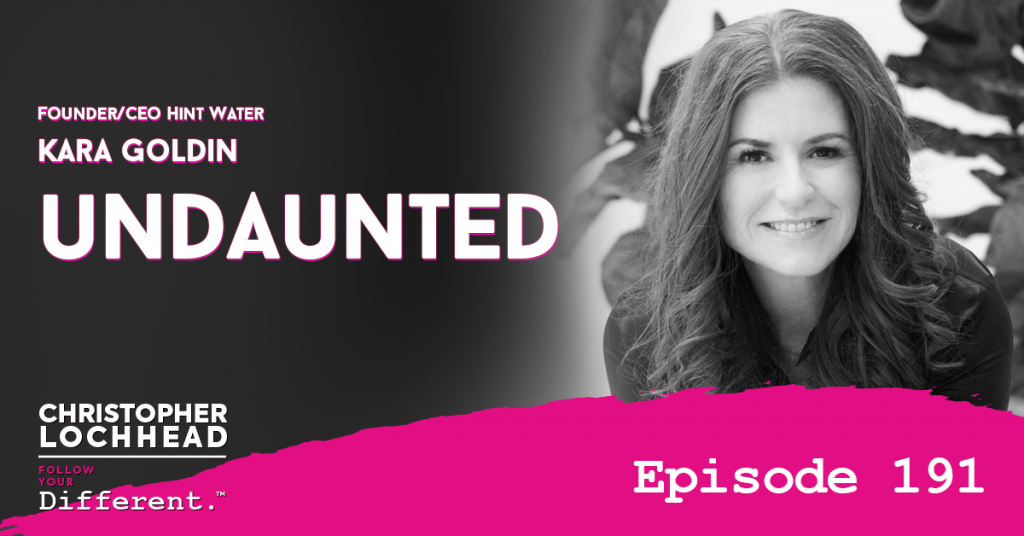
Podcast: Play in new window | Download (Duration: 1:19:34 — 54.6MB) | Embed
Subscribe: Apple Podcasts | Spotify | Pandora | RSS | More
In this episode, we do have a world changer. She’s both an entrepreneur, author, and podcaster. She’s the category queen of a new category of flavored healthy water. Her name is Kara Goldin and she’s the founder and CEO of a product you probably have tried and most likely love called Hint water.
Fortune named Kara one of the most powerful women entrepreneurs and Forbes says she’s one of the 40 Women To Watch Over 40. Today, she reveals how Hint Water could have just been another idea that never went anywhere if she had let her own doubts or the doubts of others be the end of the story.
Undaunted: Overcoming Doubts and Doubters
Kara has recently launched a new book called Undaunted: Overcoming Doubts and Doubters. It is currently number one on the Amazon charts. IN fact, Sheryl Sandberg, Chief Operating Officer at Facebook says it’s a great read for entrepreneurs looking for proof that her dream can come true.
Even if you’re not an entrepreneur, you’re going to love this conversation with Kara and the story behind her book.
You Don’t Need To Know Everything
Christopher asks Kara about the statement, “you don’t need to know everything, you just have to know where to start. Kara expounds on her opinion on this statement. A lot of times, people give all sorts of excuses to not get a project starting. Most people say they lack education, or are not well-experienced enough or they spend too much time with their kids.
“Once you ultimately start moving it forward, that actually adds up to getting over challenges, making progress. Whatever it is, you just have to start somewhere in order to ultimately get it going in some direction. You may change direction as well, but at least if you start somewhere. That’s ultimately what helps you to achieve your dream success.” – Kara Goldin
Looking For The Perfect Job
Kara made a transition from the technology world — where she was an executive handling 200 people — into starting her own business. She was against incredible odds in creating a whole new beverage category and becoming the category queen.
She recounts in this episode what made her decide to do the transition and how while she was looking for the perfect job, she was also scouting to find the best diet and for the best doctors to diagnose her as she gained weight after birthing her kids.
“I saw this, ultimately, this void in the market that would lead me to launch my company Hint. A few steps before that was when I finally decided that the best thing for me to really understand why I wasn’t as healthy as I wanted to be, would be to actually look at ingredients and everything that I was eating and drinking.” – Kara Goldin
To know more about Kara, her journey to a healthy life, and why she is undaunted, download, and listen to this episode.
Bio:
Kara Goldin is a disruptor, builder, thought leader, and successful entrepreneur.
She is the Founder and CEO of Hint, Inc., best known for its award-winning Hint® water, the leading unsweetened flavored water.
She has been named one of InStyle’s Badass 50, Fast Company’s Most Creative People in Business, Fortune’s Most Powerful Women Entrepreneurs, Fortune’s Most Innovative Women in Food & Drink, and EY Entrepreneur of the Year for Northern California.
The Huffington Post listed her as one of six disruptors in business, alongside Steve Jobs and Mark Zuckerberg.
Kara has successfully navigated the world of large companies and startups in many industries including media, tech, and consumer products.
In addition, she understands retail and direct to consumer well. She is an active speaker & writer and hosts the podcast Unstoppable with Kara Goldin where she interviews founders, entrepreneurs, and other disruptors across various industries.
Kara’s first book, Undaunted, published by Harper Leadership, will be released in October 2020.
She lives in the Bay Area.
Links:
We hope you enjoyed this episode of Follow Your Different™! Christopher loves hearing from his listeners. Feel free to email him, connect on Facebook, Twitter, Instagram, and subscribe on iTunes!
190 Lessons Learned From Running Dunkin Donuts For 35 Years | Robert Rosenberg
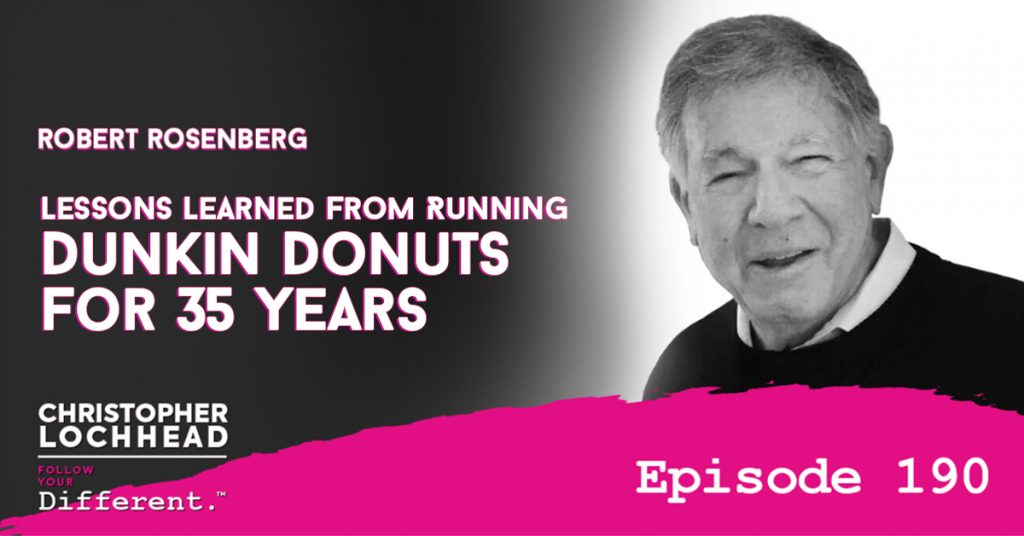
Podcast: Play in new window | Download (Duration: 1:07:05 — 46.1MB) | Embed
Subscribe: Apple Podcasts | Spotify | Pandora | RSS | More
Robert Rosenberg is a legendary entrepreneur CEO and author who has helped change the world today. He also has a brand new book, Around the Corner to Around the World: A Dozen Lessons. In his book, he talks about how he ran Dunkin Donuts and Baskin Robbins.
Today, we have a real conversation with Robert about his story and the lessons that he has learned through the successes and setbacks in his life. He lets us in on the real story behind one of the most legendary marketing campaigns of all time. He even shares with us the story of how munchkins a.k.a doughnuts holes came to be, and so much more exciting topics!
The Best and The Brightest
Robert specifically talks about David Halberstam’s book: The Best and The Brightest. The book made him realize the importance of humility and listening, rather than talking. He discusses how this has led him to place processes and policies that have helped strengthen and grow the business even further.
“It was a learning moment, I was maybe 35. So it was 10 years, I’d love to say I came into the job at 25 and was all grown up, but I wasn’t, clearly. This was a grown-up moment, and it was essential for the next four or five years, each with different responses, different strategies. Basically, we never look back and we were well on our way not to make that mistake again. I’m forever thankful and that came out of a book, but a lot of things for me came out of books.” – Robert Rosenberg
The Story of Munchkins
An interesting part of the conversation is when Robert shared how munchkins came to be. He also shares his amazement on how this Halloween product turned into the phenomenon that it is today.
“That was the beginning of a product that now when you look back 50 years later is still a mainstay on the menu. And a treat for people all the time. Not just for Halloween, but 24/7 and 12 months a year.” – Robert Rosenberg
Aspiration and Superior Strategy
The ability to build the value of the brand, through a real commitment to product quality, and through great organization and an incredible team has led Dunkin Donuts into the industry it is today. Robert even shares his 3 P’s: good planning, great people, and a real commitment to products.
“You don’t necessarily pick the times it comes. Believe me, for 35 years, it’s gone, come and you have to be prepared for that because day to day activities, things come in over the transom constantly at you. It’s easy to get waylaid and in my view, if the strategy isn’t spot on, if the organization isn’t appropriate and spot-on, this little else you can do in terms of activity that can save the day and create success.” – Robert Rosenberg
To know more about Robert Rosenberg and his story and Lessons Learned From Running Dunkin Donuts For 35 Years, download and listen to this episode.
Bio:
Robert M. Rosenberg (born 1938) is an American businessman, professor, and author. He was the chief executive officer of Dunkin’ Donuts for thirty-five years from 1963 to 1998 and also served on the board of directors of Sonic Corp and Domino’s Pizza. He was also an adjunct professor at Babson College’s F. W. Olin Graduate School of Business.
In 1963, at the age of 25,[9] Rosenberg assumed leadership of his family business, Universal Food Systems, as CEO and president. At the time, the company consisted of several small businesses grossing $20 million per year, including 100 Dunkin’ Donuts locations in the U.S., generating $10 million in annual sales. Rosenberg transformed Universal Food Systems to focus on Dunkin’ Donuts.
On February 6, 1968, Rosenberg took the company through its initial public offering. In September 1983, Rosenberg became chairman while continuing to serve as CEO of Dunkin’ Donuts. The company remained publicly traded until 1989, earning investors a 35% compound rate of return. During his tenure as Dunkin’ Donuts CEO, Rosenberg served on the board of the International Franchise Association. In 1970, he served as the association’s chairman.
In late 1989, Dunkin’ Donuts announced its acquisition by Allied-Lyons PLC, a large UK food and beverage group which also owned Baskin-Robbins. Rosenberg continued to lead the company that became known as Allied Domecq Retailing (later Dunkin’ Brands) which also acquired Togo’s sandwich shops. By the time Rosenberg retired in 1998, the company had about 6,500 locations around the world.
Following his retirement, Rosenberg went on to become an adjunct professor at Babson College’s F. W. Olin Graduate School of Business. He also served as a trustee of the college. In addition to teaching at Babson, Rosenberg was on the board of directors at Sonic Corp., from April 1993 to 2016, and Domino’s Pizza, from 1999 until April 2010, where he served both companies as chairman of their compensation committees.
Links:
Book: Around the Corner to Around the World: A Dozen Lessons I Learned Running Dunkin Donuts
We hope you enjoyed this episode of Follow Your Different™! Christopher loves hearing from his listeners. Feel free to email him, connect on Facebook, Twitter, Instagram, and subscribe on iTunes!
189 How to Decide | Annie Duke, Champion Poker Player
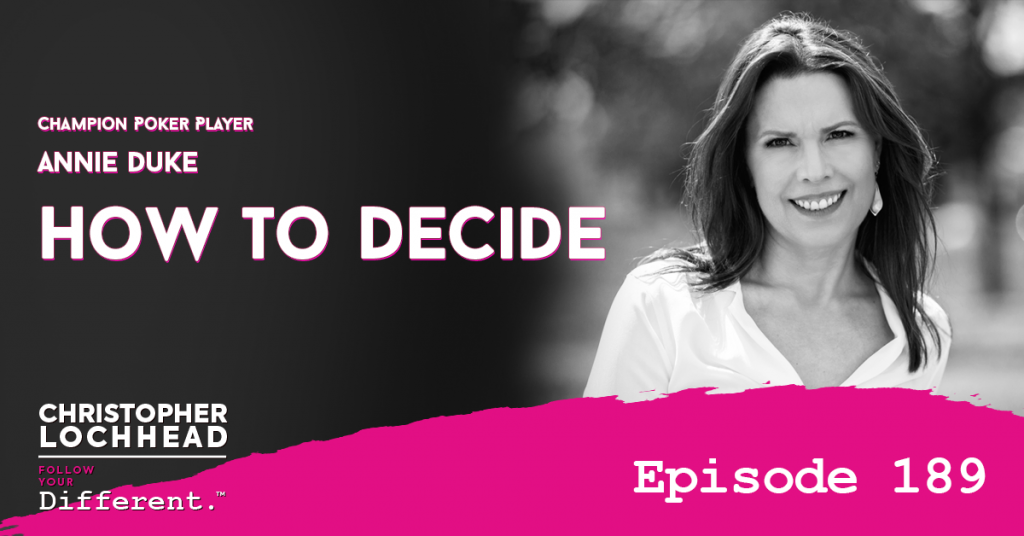
Podcast: Play in new window | Download (Duration: 1:26:33 — 59.4MB) | Embed
Subscribe: Apple Podcasts | Spotify | Pandora | RSS | More
We continue our run on legendary authors with our guest today, Annie Duke. She’s got a new book out called How To Decide: Simple Tools For Making Better Choices. In this episode, she teaches us about how she thinks about decisions, and how building stronger decision skills can make a difference at a time of crisis, particularly like the kind of time we’re living in now.
She was one of the world’s top professional poker players. She tells us how to think about the possible and the probable, how to think about the different futures that could occur. Anne’s got a very provocative point of view about luck that I think you’ll find fascinating. In addition, I would suggest you pay close attention to her thoughts on the power of a hedge.
Every Decision Is A Bet
Annie briefly tells us what has been going on in her life and family, especially during the pandemic. She shares her personal journey and professional background on how she got into poker. Take note where she shares how to decisions while facing massive amounts of uncertainty.
“The point is to hold all those possibilities in your head at once. To be thinking when you should be making the decision. What does that look like under different futures that might occur? So how much money might you win or gain under those futures, or I might be setting up a play. If one of those futures were to occur, you might do something now that allows you to do something later. You have to be thinking about all those things at once. So you always have to have it in mind that the future is uncertain.” – Annie Duke
Hedging Bets
On this topic, Annie discusses the companions to bets, which are called a ‘hedge’. This, diving in deeper, can refer to the different ways the future can unfold and the negative impact it can have in life. Annie shares with us further its meaning as well as examples to help set the tone of the message.
Further, she advises to mitigate and weigh in the cost that comes with the negative outcomes. She then connects hedging with what she calls ‘the paradox of experience’.
“It fits into this broad category of something I call the paradox of experience, which is that you need experience in order to become a better decision maker. Any single experience could interfere with the lessons that you learn. There’s many, many possible futures, but only one past. Once we know the past that occur, we sort of think of it as inevitable. Then we regret having done anything that would plan for any other future.” – Annie Duke
Good Decision Process
Annie discusses how choosing different options can contribute to the likelihood of receiving luck. This luck can influence life in different ways, whether for the good or bad. In addition, she discusses beliefs as a foundation of the decision making process and how the information gathered from this can contribute to the decisions made.
“There’s different probabilities of each option occurring. It could be that you have the same set of possibilities, but they have different impacts. The magnitude of those things is different. So this kind of tells you now if you can think about those two options. You want to understand what that set looks like. And then when you choose an option, what you’ve done is you’ve decided on the set of possibilities, and how probable each of those things is to occur. Which thing actually happens.” – Annie Duke
To know more about how to make better decisions and the challenges that come with it, download and listen to this episode.
Bio:
Annie Duke has leveraged her expertise in the science of smart decision making to excel at pursuits as varied as championship poker to public speaking.
Annie’s latest book, How to Decide: Simple Tools for Making Better Choices, is available on September 15, 2020, from Portfolio, a Penguin Random House imprint. Her previous book, Thinking in Bets, is a national bestseller.
In the book, Annie reveals to readers the lessons she regularly shares with her corporate audiences, which have been cultivated by combining her academic studies in cognitive psychology with real-life decision-making experiences at the poker table.
For two decades, Annie was one of the top poker players in the world. In 2004, she bested a field of 234 players to win her first World Series of Poker (WSOP) bracelet.
The same year, she triumphed in the $2 million winner-take-all, invitation-only WSOP Tournament of Champions. In 2010, she won the prestigious NBC National Heads- Up Poker Championship.
She retired from the game in 2012. Prior to becoming a professional poker player, Annie was awarded a National Science Foundation Fellowship to study Cognitive Psychology at the University of Pennsylvania, where she earned her master’s degree.
Annie now spends her time writing, coaching, and speaking on a range of topics such as decision fitness, emotional control, productive decision groups, and embracing uncertainty.
She is a regularly sought-after public speaker, addressing thousands in keynote remarks at conferences for organizations ranging from the Investment Management Consultants Association to the Big Ten Conference.
She has been brought in to speak to the executive teams or sales forces of organizations like Marriott, Gaylord Resorts, and Ultimate Software, among others. She is a sought-after speaker in the financial sector, with clients such as Susquehanna International Group and CitiBank.
Annie regularly shares her observations on decision making and critical thinking skills on her blog, Annie’s Analysis, and has shared her poker knowledge through a series of best-selling poker instruction and theory books, including Decide to Play Great Poker and The Middle Zone: Mastering the Most difficult Hands in Hold’em Poker (both co-authored with John Vorhaus).
Annie is a master storyteller, having performed three times for The Moth, an organization that preserves the art of spoken word storytelling.
One of her stories was selected by The Moth as one of their top 50 stories and featured in the organization’s first-ever book.
Her passion for making a difference has helped raise millions for charitable causes. In 2006, she founded Ante Up for Africa along with actor Don Cheadle and Norman Epstein, which has raised more than $4 million for Africans in need.
She has also served on the board of The Decision Education Foundation. In 2009, she appeared on The Celebrity Apprentice and raised $730,000 for Refugees International, a charity that advocates for refugees around the world.
In October 2013, Annie became a national board member for After School All-Stars. In 2014, Annie co-founded The Alliance for Decision Education to build a national movement that empowers teachers, school administrators and policymakers to bring Decision Education to every Middle and High School student. In 2016, she began serving on the board of directors of The Franklin Institute, one of America’s oldest and greatest science museums. In 2020, she joined the board of the Renew Democracy Initiative.
Annie currently resides in the Philadelphia area.
Links:
We hope you enjoyed this episode of Follow Your Different™! Christopher loves hearing from his listeners. Feel free to email him, connect on Facebook, Twitter, Instagram, and subscribe on iTunes!
188 Inside President Trump’s Business, Taxes & More w/ Author of Whitehouse Inc. Dan Alexander (Part 2)
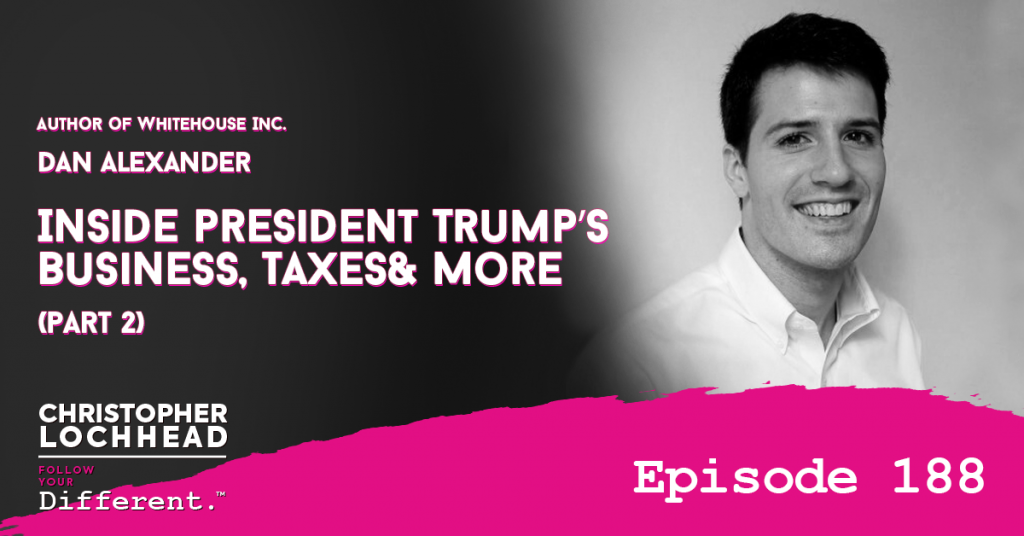
Podcast: Play in new window | Download (Duration: 51:46 — 35.5MB) | Embed
Subscribe: Apple Podcasts | Spotify | Pandora | RSS | More
This is a giant one! Our prediction is that this episode will break the internet. Today, the second part of the series, we go deep with the Forbes reporter who, in all likelihood knows more about President Trump’s business, than anyone outside The Trump Organization, Dan Alexander. He’s got a deeply researched book called Whitehouse Inc. How Donald Trump Turned The Presidency Into A Business.
We think it is important for every American voter, whether you love President Trump or not, to know what kind of business person he is. President Trump has promoted himself as an entrepreneur, so now we get to go deep into his business.
Stunning Revelations
There are many stunning revelations in this first part of the series. Dan answers the question, is the President actually a billionaire. He examines for us how well or how poorly the president businesses are currently doing, where he makes money, and loses money. He also dives deep into how much the President would have made if he had sold all of his assets, and put them in a blind trust and whether or not that would have been a better move for him.
“I believe it was 1982. Donald Trump was on the first one [Forbes 400]. He should not have been, but he snuck his way onto that list. His father deserves to be on it. He did not. He sort of conned his way onto the list.” – Dan Alexander
Owning Complex Businesses
Also, you’re going to discover what happened politically, after the Government of Qatar rented office space in a building in San Francisco, that the President owns 30% of. We also get into the potential conflicts of interest the President faces as he owns such a complex business organization. Further, we get Dan’s take on the New York Times report on Mr. Trump’s taxes.
Conversation with Eric Trump
You can also find in this episode about Dan’s conversation with Eric Trump and what Eric Trump told Dan, about his father’s involvement in the business during the presidency. Eric also revealed to Dan, what the Trump organization’s real business strategy is, and a whole lot more.
Dan and Christopher try to unpack this information as best as possible.
“I asked Eric about it. I said, ‘what are your plans here?’ He told me, flat-out, that he planned on updating his dad on the financials of the business. This was like a month or two after his dad said the exact opposite. So right there, upfront, one of the core promises falls by the wayside. Then you have Trump promises that he’s not going to do any new foreign deals. He does limit some of his foreign deals, as I mentioned earlier. He does do new foreign deals, he ends up selling land in the Dominican Republic while he’s in office.” – Dan Alexander
To know more inside information on President Trump’s Business, Taxes & More and for more information about the author of Whitehouse Inc., Dan Alexander, download and listen to this episode.
Bio:
Dan Alexander is a Senior Editor at Forbes where he covers President Donald Trump and he’s the author of White House, Inc.
Links:
Sfchronicle.com, SF’s 555 California, partly owned by Trump, could be sold
NY Times Book Review: White House Inc.
We hope you enjoyed this episode of Follow Your Different™! Christopher loves hearing from his listeners. Feel free to email him, connect on Facebook, Twitter, Instagram, and subscribe on iTunes!
187 Inside President Trump’s Business, Taxes & More w/ Author of Whitehouse Inc. Dan Alexander (Part 1)
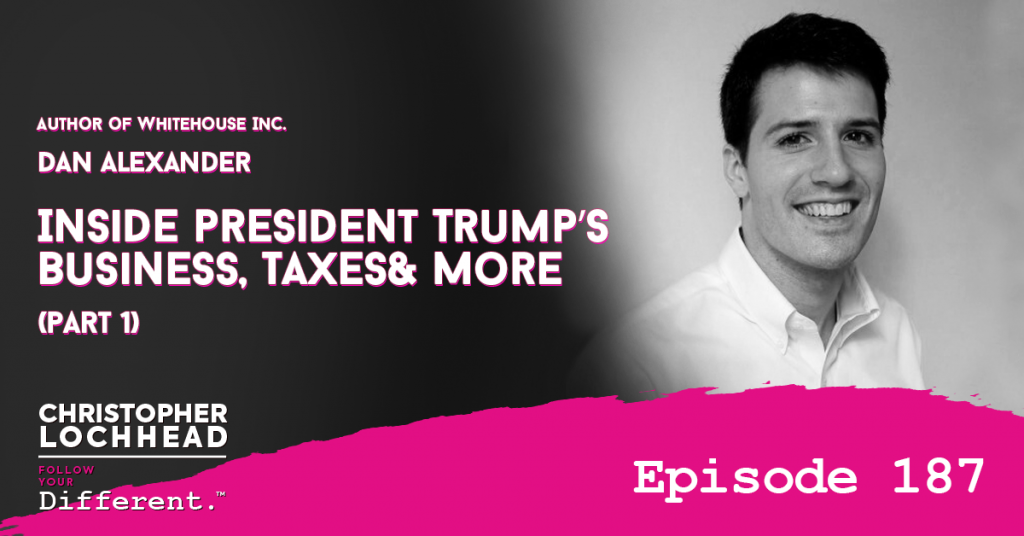
Podcast: Play in new window | Download (Duration: 1:05:10 — 44.7MB) | Embed
Subscribe: Apple Podcasts | Spotify | Pandora | RSS | More
This is a giant one! Our prediction is that this episode will break the internet. Today, the first of two episodes, we go deep with the Forbes reporter who, in all likelihood knows more about President Trump’s business, than anyone outside The Trump Organization, Dan Alexander. He’s got a deeply researched book called Whitehouse Inc. How Donald Trump Turned The Presidency Into A Business.
We think it is important for every American voter, whether you love President Trump or not, to know what kind of business person he is. President Trump has promoted himself as an entrepreneur, so now we get to go deep into his business.
Stunning Revelations
There are many stunning revelations in this first part of the series. Dan answers the question, is the President actually a billionaire. He examines for us how well or how poorly the president businesses are currently doing, where he makes money, and loses money. He also dives deep into how much the President would have made if he had sold all of his assets, and put them in a blind trust and whether or not that would have been a better move for him.
“I believe it was 1982. Donald Trump was on the first one [Forbes 400]. He should not have been, but he snuck his way onto that list. His father deserves to be on it. He did not. He sort of conned his way onto the list.” – Dan Alexander
Owning Complex Businesses
Also, you’re going to discover what happened politically, after the Government of Qatar rented office space in a building in San Francisco, that the President owns 30% of. We also get into the potential conflicts of interest the President faces as he owns such a complex business organization. Further, we get Dan’s take on the New York Times report on Mr. Trump’s taxes.
Conversation with Eric Trump
You can also find in this episode about Dan’s conversation with Eric Trump and what Eric Trump told Dan, about his father’s involvement in the business during the presidency. Eric also revealed to Dan, what the Trump organization’s real business strategy is, and a whole lot more.
Dan and Christopher try to unpack this information as best as possible.
“I asked Eric about it. I said, ‘what are your plans here?’ He told me, flat-out, that he planned on updating his dad on the financials of the business. This was like a month or two after his dad said the exact opposite. So right there, upfront, one of the core promises falls by the wayside. Then you have Trump promises that he’s not going to do any new foreign deals. He does limit some of his foreign deals, as I mentioned earlier. He does do new foreign deals, he ends up selling land in the Dominican Republic while he’s in office.” – Dan Alexander
To know more inside information on President Trump’s Business, Taxes & More and for more information about the author of Whitehouse Inc., Dan Alexander, download and listen to this episode.
Bio:
Dan Alexander is a Senior Editor at Forbes where he covers President Donald Trump and he’s the author of White House, Inc.
Links:
Sfchronicle.com, SF’s 555 California, partly owned by Trump, could be sold
NY Times Book Review: White House Inc.
We hope you enjoyed this episode of Follow Your Different™! Christopher loves hearing from his listeners. Feel free to email him, connect on Facebook, Twitter, Instagram, and subscribe on iTunes!
186 Purpose Driven with Sal Khan (Khan Academy) & Navin Chaddha (Mayfield)
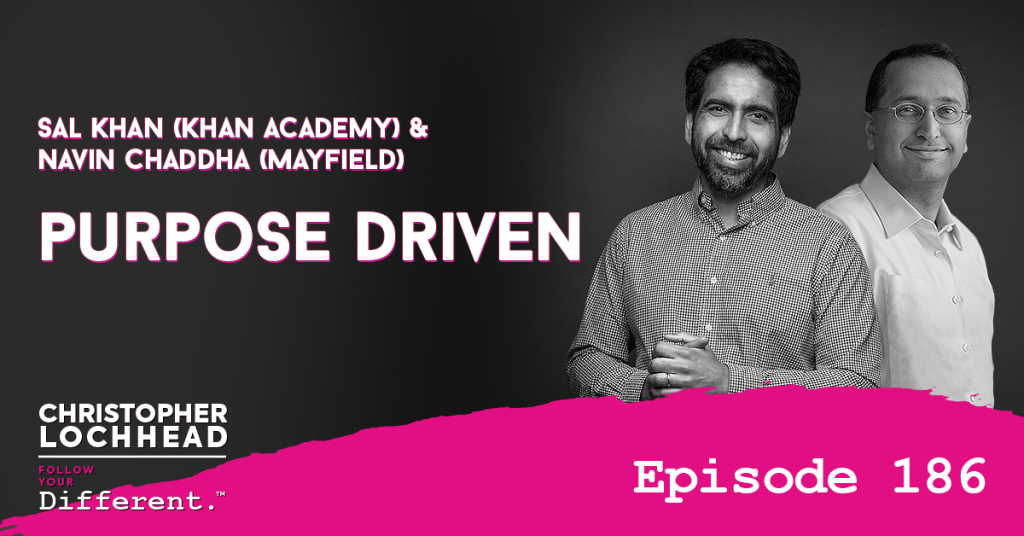
Podcast: Play in new window | Download (Duration: 39:15 — 26.9MB) | Embed
Subscribe: Apple Podcasts | Spotify | Pandora | RSS | More
We have another super special episode for you today. Recently, Christopher was lucky enough to get an opportunity to start a new podcast with Navin Chaddha, who leads Mayfield, one of the top venture capital firms in Silicon Valley. What you’re about to listen to is a recent episode of the brand new podcast called Conscious VC. It’s with an extraordinary man named Sal Khan.
In this episode of Conscious VC, Naveen and Christopher have a riveting conversation with Sal, he takes you into why his mission is free education for everyone in the world. He unveils some of his biggest learnings in building an incredible education nonprofit, the Khan Academy, and his key learnings for entrepreneurs.
Free World Class Education
Navin, Sal, and Christopher discuss Sal’s professional and personal achievements, as well as, Khan Academy, its mission and what it stands for. Sal goes into detail about Khan Academy’s mission not being about profit, but rather establishing free world class education for anyone anywhere. He hopes that this platform can lead to various opportunities for the children. Whether that be through college admissions, apprenticeships, and job opportunities.
“You know, I think these days, it’s very easy to beat up on public education. There’s a lot of things that are imperfect, a lot of things that need to be fixed. We’re trying to work in partnership with school districts and teachers to help address some of that. I think it is worth it. Giving credit for how much the world has transformed because of this very aspirational public education.” – Sal Khan
Be Authentic and Honest
Sal and Navin dive deeper into the factors that have contributed to Khan Academy and Mayfield’s success. Sal shares his key learnings and advice for entrepreneurs who plan to follow in his footsteps. It all starts with the vision, mission, and key insight. These all bring back to the question of how one can make the world a better place. He continues to discuss how content should be based on what you’re excited about and what you truly believe in. Sal hopes Khan Academy can fulfill this potential and create a legacy that can help shape the world.
“My role is to make sure that Khan Academy can really stay true to the vision. Now, while hopefully I’m alive for many decades. I want to retain it, that focus on a mission, which historically, nonprofits can be reasonably good at. At the same time, I want to stay nimble. There’s one fear that Khan Academy disappears, and it’s not able to fulfill its potential. There’s another fear that it fulfills its potential, but then it becomes the legacy, it becomes the entrenched interest.” – Sal Khan
Creating Pathways to Learning
Navin and Sal share more about Mayfield and Khan Academy as well as the programs they offer to help expand the students opportunities for learning and growth. He discusses his fascination on these innovative models and how they have paved a way to the hybrid online world. Sal then goes on to talk about how these programs are truly a fast track opportunity for the students. In addition, he shares the struggles that they have been facing combining both the platforms of education in the midst of the pandemic.
“I think from my perspective, we need more people like what Sal has done with his life. People who are helping build businesses, for better and are making a positive impact in the world. I hope many people and entrepreneurs who don’t need to do this, including VCs like me, use our time, money, ideas and access. We can even start with 1%. And that’s what Mayfield has started with the pledge 1%. And my belief is, each smaller drop in the bucket fills buckets that can fill in a pond, and then sky’s the limit. So we have to just get started and have role models like Sal and others who are showing us the way. I think we have endless possibilities.” – Navin Chaddha
To know more about the mission and vision of Khan Academy and Mayfield, download and listen to this episode.
Bio:
Navin Chaddha
Navin Chaddha leads Mayfield. He has ranked on the Forbes Midas List of Global Tech Investors 12 times, including being named a Top Five investor in 2020.
During his career as a venture capitalist, he has invested in over 50 companies, 17 of which have gone public and 20 have been acquired. Some of his investments include Lyft, Poshmark, SolarCity, Hashicorp, Elastica, CloudGenix, and CloudSimple.
As an entrepreneur, he has co-founded or led three startups including VXtreme, a streaming media platform, acquired by Microsoft to become Windows Media.
Navin is a committed philanthropist who directs Mayfield’s 50-year tradition of philanthropy to support many causes including diversity, health, hunger, and education.
Interests: Cricket, Bollywood.
Salman Khan
Salman Amin (Sal) Khan (age 42) is a New Orleans educator, entrepreneur, philanthropist, and former hedge fund analyst. He is the founder of the Khan Academy, a free online education platform and nonprofit organization. From a closet in his home, Khan has produced over 11,500 videos, teaching a wide spectrum of academic subjects, mainly focusing on mathematics and the sciences. As of August 2019, the main Khan Academy Channel on YouTube attracted more than 5,017,000 subscribers.
Being founder and faculty means Sal’s busy setting the vision for the Khan Academy and expanding our library of educational videos.
Before quitting his job as manager of a hedge fund to run the Khan Academy full-time, Sal also found time to get three degrees from MIT and an MBA from Harvard. – Khan Academy
Links:
Follow Your Different Episode 168
We hope you enjoyed this episode of Follow Your Different™! Christopher loves hearing from his listeners. Feel free to email him, connect on Facebook, Twitter, Instagram, and subscribe on iTunes!
185 UnHealthcare: Why The Future is “Health Assurance” | Kevin Maney Bestselling Author / Category Designer
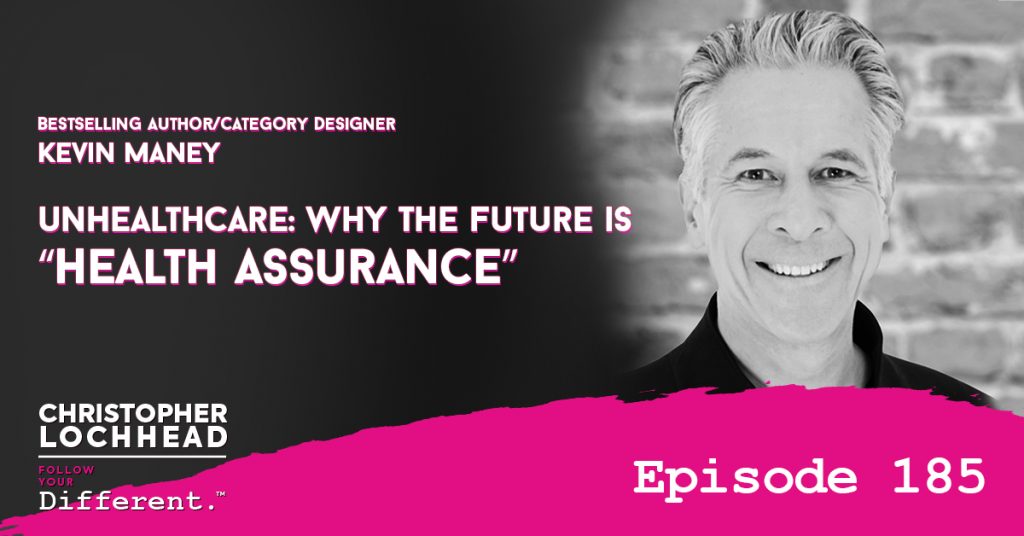
Podcast: Play in new window | Download (Duration: 1:12:40 — 49.9MB) | Embed
Subscribe: Apple Podcasts | Spotify | Pandora | RSS | More
We continue our run on legendary, bestselling authors today with Kevin Maney. Kevin is a technology executive who’s covered tech for over 25 years for outfits like USA Today, Newsweek, and many others. He’s the co-author of my first book: Play Bigger: How Pirates, Dreamers, Innovators Create and Dominate Markets.
Today, we have a fascinating conversation about how technology is driving a massive shift from traditional approaches to health care — which Kevin sort of frames as “sick care”— to a new category that he and his co-authors called health assurance.
Conscious Capitalism
Kevin believes that consumers will start to embrace new and interesting products and services when the pandemic ends. In fact, the VC community and Fortune 500 companies started to realize a massive shift within their policies and are now focusing on conscious capitalism.
“We’re actually embarking on a huge project that has around this idea of, call it what you will, conscious capital of responsible innovation.” – Kevin Maney
From Book to New Category Design
Kevin describes how he got together with Stephen Klasko, the CEO of Jefferson Health, one of the biggest health care systems in the country based in Philadelphia. They took that healthcare chapter of Kevin’s book, Unscaled, to write a manifesto.
The manifesto is about 60 pages long, describing how new technologies can take apart the old healthcare system, which was based on taking care of people after they were sick.
“We actually tried to attempt in this book to literally create a new category of healthcare that we call health assurance.” – Kevin Maney
What Healthcare Has Become
In part, Kevin describes the word healthcare as becoming an industrial complex, in reality, is not a “healthcare system.” He further shares that the system is designed to take care of us after something bad happens to us, not to help us stay healthy. The economic incentives are around doing operations and not keeping us “out of hospitals.”
“We ended up writing about in the book, these health assurance technologies that have been in place before COVID happened. You would have been able to see the patterns happening as it shifts around the globe, in almost real-time. So we ended up redoing the book to reflect all of that.” – Kevin Maney
To learn more about healthcare and why the future calls for health assurance, download and listen to this episode.
Bio:
Kevin Maney is a bestselling author, award-winning columnist, and partner at Category Design Advisors (CDA). He co-authored Play Bigger: How Pirates, Dreamers, and Innovators Create and Dominate Markets, which gave birth to the discipline of category design.
His book The Maverick and His Machine: Thomas Watson Sr. and the Making of IBM is the definitive biography of the man who built IBM.
Maney has been a contributor to Newsweek, Fortune, The Atlantic, Fast Company, Strategy + Business, HBR.com, CNN, and ABC News, among other media outlets.
Additionally, he was a contributing editor at Conde Nast Portfolio during its brief run from 2007 to 2009. For 22 years, Maney was a columnist, editor, and reporter at USA Today.
He’s appeared frequently on television and radio, including CBS Sunday Morning and NPR, and lectures at conferences and universities, including New York University, UNC in Chapel Hill, and his alma mater, Rutgers.
Links:
We hope you enjoyed this episode of Follow Your Different™! Christopher loves hearing from his listeners. Feel free to email him, connect on Facebook, Twitter, Instagram, and subscribe on iTunes! Get amazing, different stories on business, marketing, and life. Subscribe to our newsletter The Difference.
184 Create Your Own Calm | Bestselling Author Meera Lee Patel

Podcast: Play in new window | Download (Duration: 56:43 — 38.9MB) | Embed
Subscribe: Apple Podcasts | Spotify | Pandora | RSS | More
Today, we have a riveting conversation with bestselling author and artist Meera Lee Patel. She’s got a new book out called Create Your Own Calm: A Journal for Quieting Anxiety.
We have a powerful conversation about dealing with anxiety and why Meera thinks, “the more you run away from something, the more it follows you.” You’ll also enjoy Meera’s thoughts on self-acceptance, why journaling is a powerful conversation with yourself, and pay special attention to Meera’s ideas around “the only way out – is through.”
Dealing With Anxiety
Meera describes where she is at the moment. She is in an in-between/transition time where she is feeling overwhelmed. Further, she shares that she is struggling to be “at the moment.” She is at, exactly what Christopher describes as, the “cocoon period.”
“I feel unable to act sometimes to take action and that’s on several different levels. Personal, emotional professional, I feel like I can’t take action or make the changes that I want to make. Some of them are true, some of the limitations that I faced that we’re all facing — travel, leaving our homes, things like that. They’re real. Some of them, especially the emotional and mental ones, like, in most cases, they’re not real. They’re self-implemented and I’m working on undoing them.” – Meera Lee Patel
What You Resist, Persists
Meera describes how we are all in a constant anxious state. She reminds us of the importance of understanding why things are happening to us and the need to address this head-on to be able to work through them. She believes that ignoring what causes your anxiety will run after you in a different setting.
“I think that is far more healthy and productive and useful than simply ignoring or pushing aside, or forgetting about what’s happening. So often when people say ‘to just suck it up,’ ‘you need to move on,’ ‘don’t dwell on this.’ What they’re doing is ignoring what’s happening to them.” – Meera Lee Patel
Different Worlds and Philosophies
People are often surprised when they meet Meera as she has “different worlds and philosophies.” She has different sides that are not exactly visible on her Instagram account.
“I think in my work, my artwork especially, which tends to be very vibrant, and ethereal, expresses a side of me that would be unseen. Otherwise, that is simply the form it takes. It comes out in my painting, this very upbeat, kind of beautiful, peaceful watercolor, those aspects of my personality and my being come out in my work.” – Meera Lee Patel
Meera also talks about why journaling is a form of conversation with oneself and a whole lot more.
To know more about Meera and how to create your own calm, download and listen to this episode.
Bio:
Meera Lee Patel is a self-taught artist and writer who believes that anything is possible.
She is the author of My Friend Fear: Finding Magic in the Unknown (TarcherPerigee, an imprint of Penguin Random House) a beautiful meditation on fear and how it can help us become who we really are–if we let it.
She is also the author of three journals with TarcherPerigee, an imprint of Penguin Random House: Create Your Own Calm, a journal for quieting anxiety which encourages self-acceptance for quelling anxiety and stress.
Made Out of Stars, a journal for self-realization that encourages the belief that we are already whole. Start Where You Are is a journal for self-exploration that is designed to help others understand that the answers they are seeking are contained within themselves.
She is currently a core contributor to Uppercase Magazine, where she creates visual essays about the intersection of creativity and mental health.
Links:
Website: Meera Lee
Instagram: @meeraleepatel
Etsy: Meera Lee Patel
Amazon: Meera Lee Patel
We hope you enjoyed this episode of Follow Your Different™! Christopher loves hearing from his listeners. Feel free to email him, connect on Facebook, Twitter, Instagram, and subscribe on iTunes! Get amazing, different stories on business, marketing, and life. Subscribe to our newsletter The Difference.
183 Life Is In The Transitions | Bruce Feiler, 7X NY Times Bestselling Author
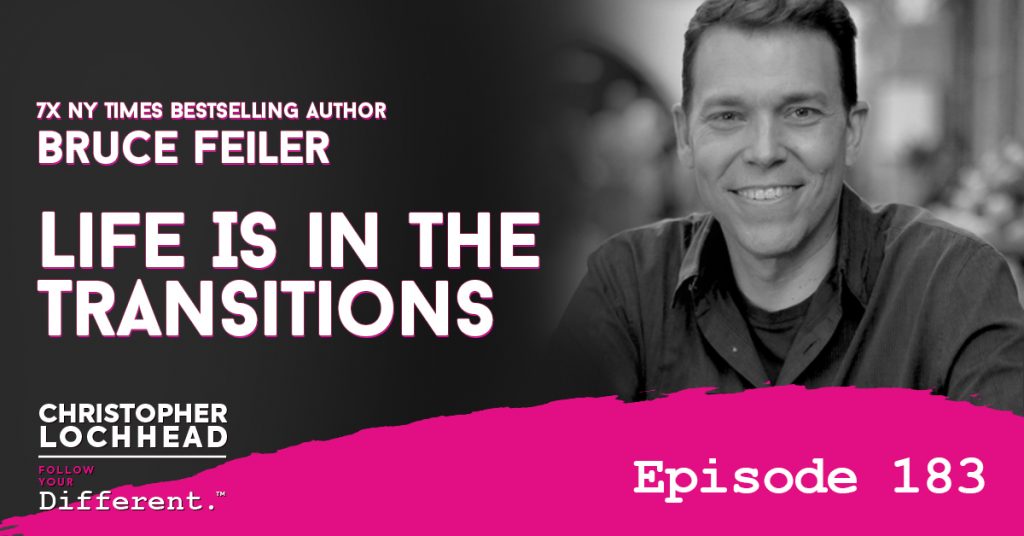
Podcast: Play in new window | Download (Duration: 1:25:48 — 58.9MB) | Embed
Subscribe: Apple Podcasts | Spotify | Pandora | RSS | More
Bruce Feiler is a legendary thinker and writer and unlike in a normal interview, we go deep in this episode. Bruce has a monster new book out called Life Is in the Transitions. Today, we have a very big conversation about what Bruce calls “life quakes,” both voluntary (new job, getting married, moving) and involuntary (death of a loved one, loss of a job, divorce, etc).
We also talk about why the linear, up and to the right “hero story” we get told about life is bullshit, why C19 is a collective, involuntary, life quake, what that means for all of us, and much more!
Life Quakes
Bruce shares how all the events that have occurred in his life led to his professional career today. He shares what he calls “life quakes” which pertains to a moment of big wrenching change that happens in one’s life.
This pandemic has coincided with his book, Life is in The Transitions, which asks “how do you deal with the life quakes that happen in your lives?” Bruce even shares the “life quake” that he went through in order to have this mindset.
Involuntary and Voluntary
Bruce talks about how reading helped him discover the false narrative that is being blocked into human beings. He speaks about the narrative of life, being a linear path with only one bump along the way to success and happiness.
This has led Bruce to believe that 53% of life quakes are involuntary and only 47% are voluntary, which he further explains in this episode.
“I had to figure out what is going on now. How we see the world and how we need to update the way we look at our life. How do people tell their stories? This is what I uncovered. The linear life is dead. It’s been replaced by nonlinear life. The nonlinear life involves many more life transitions. That became the big idea that emerged from my experience.” – Bruce Feiler
Life Transitions
Bruce shares how life quakes can either be voluntary or involuntary. Life transitions, on the other hand, must be voluntary. He advises people to make decisions that will bring back the power to control one’s life.
In addition, he discusses how finding a higher calling can make you feel part of the team. A team that will help you get through your life transition together. It may rather be a rough and painful journey but it is a road paved with growth and renewal.
“If we look at life transitions as periods that we have to suffer our way through, we are wasting half of our life. If we look at them as periods, they’re going to be difficult and painful, but there’s also opportunities for growth and renewal. That’s the story of your life.” – Bruce Feiler
To know more about life quakes and the transitions that come with it, listen to this episode.
Bio:
BRUCE FEILER is one of America’s most popular voices in contemporary life.
He is the author of seven New York Times bestsellers; the presenter of two prime-time series on PBS; and the inspiration for the drama COUNCIL OF DADS on NBC.
Bruce’s two TED Talks have been viewed more than two million times. Employing a firsthand approach to his work, Bruce is known for living the experiences he writes about. His work combines timeless wisdom with timely knowledge turned into practical, positive messages that allow people to live with more meaning, passion, and joy.
His new book, LIFE IS IN THE TRANSITIONS: Mastering Change at Any Age, describes his journey across America, collecting hundreds of life stories, exploring how we can navigate the growing number of life transitions with greater purpose and skill. “One of those books that’s so profoundly aligned with the zeitgeist that you end up underlining the whole book,” wrote Arianna Huffington in Thrive Global. “Bruce Feiler is the perfect person to lead us on this journey.”
The book was a Top 10 New York Times bestseller.
For more than a decade, Bruce has explored the intersection of families, relationships, health, and happiness. His book THE SECRETS OF HAPPY FAMILIES collects best practices from some of the country’s most creative minds. The book was featured on World News, GMA, and TODAY and excerpted in the Wall Street Journal, the New York Times, and Parade. THE COUNCIL OF DADS describes how, faced with one of life’s greatest challenges, he asked six friends to support his young daughters.
The book was profiled in PEOPLE, USA Today, and Time and was the subject of a CNN documentary hosted by Dr. Sanjay Gupta.
Links:
We hope you enjoyed this episode of Follow Your Different™! Christopher loves hearing from his listeners. Feel free to email him, connect on Facebook, Twitter, Instagram, and subscribe on iTunes! Get amazing, different stories on business, marketing, and life. Subscribe to our newsletter The Difference.

